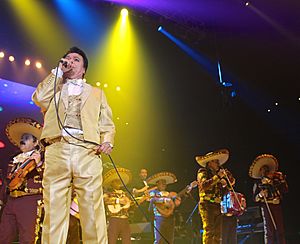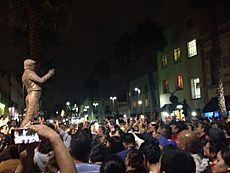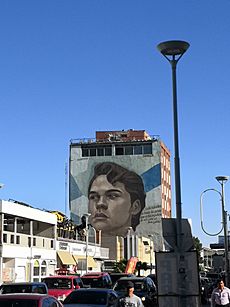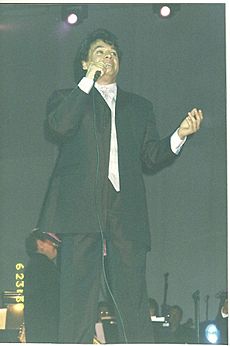Juan Gabriel facts for kids
Quick facts for kids
Juan Gabriel
|
|
|---|---|
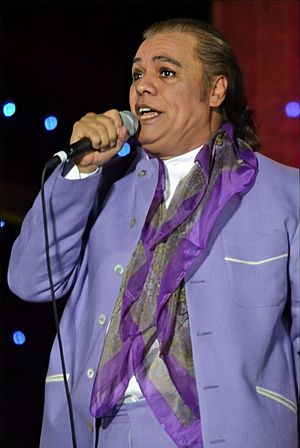
Juan Gabriel in 2012
|
|
| Born |
Alberto Aguilera Valadez
7 January 1950 Parácuaro, Michoacan, Mexico
|
| Died | 28 August 2016 (aged 66) Santa Monica, California, United States
|
| Other names |
|
| Occupation |
|
| Musical career | |
| Origin | Ciudad Juárez, Chihuahua, Mexico |
| Genres |
|
| Years active | 1971–2016 |
| Labels | |
| Associated acts |
|
| Signature | |
 |
|
Alberto Aguilera Valadez (born January 7, 1950 – died August 28, 2016), known professionally as Juan Gabriel, was a famous Mexican singer, songwriter, and actor. People often called him Juanga or El Divo de Juárez. He was known for his exciting and unique style, which helped change Latin music. Many people think he was one of the best and most creative Mexican composers and singers ever. He is often called a pop icon.
Juan Gabriel sold about 40 million records around the world. This makes him one of Latin America's best-selling music artists. His album, Recuerdos, Vol. II, is said to be the best-selling album in Mexico's history, with over eight million copies sold. During his career, Juan Gabriel wrote about 1,800 songs.
Some of his most famous songs include "Amor eterno", "Querida", "Yo no nací para amar", "Hasta que te conocí", "El Noa Noa", "No tengo dinero", "Abrázame muy fuerte", and "Siempre en mi mente". He sang these songs himself, and many other artists also performed them.
Contents
Early Life of Juan Gabriel
Alberto Aguilera Valadez was born on January 7, 1950, in Parácuaro, Michoacán, Mexico. His parents were farmers, and he was the youngest of ten children. When he was young, his father became ill. Because of this, his mother moved to Ciudad Juárez, Chihuahua. Alberto was then placed in the El Tribunal boarding school, where he stayed for eight years.
At the school, he met the director, Micaela Alvarado, and a teacher named Juan Contreras. Alberto became very close with Mr. Contreras. When he was 13, Alberto left the school and lived with Mr. Contreras for a year. In the same year, Alberto wrote his very first song. At 14, he went back to live with his mother in the town center. He became interested in a local Methodist Church and met two sisters, Leonor and Beatriz Berúmen, who welcomed him. He sang in the choir and helped clean the church.
In 1965, Alberto first appeared on a TV show called Noches Rancheras in Ciudad Juárez. The host, Raúl Loya, gave him the stage name Adán Luna. On the show, he sang "María la Bandida". From 1966 to 1968, he started singing at a bar called Noa-Noa. During this time, he wrote the song "El Noa Noa". He also sang in other bars. Later, he went to Mexico City to try and get a record deal, but he was turned down. He returned to Juárez and kept singing in bars.
The next year, he tried again to get signed by a record label. At RCA Víctor, he was hired to sing backup for other artists like Roberto Jordan and Angélica María. In 1970, he quit because he wasn't paid enough and went back to singing in Juárez bars. People told him he should try again in Mexico City, so he went back a third time the next year. He didn't have much money and sometimes slept in bus or train stations. At one point, he was wrongly accused of robbery and was held in the Palacio de Lecumberri for a year and a half. While there, he wrote songs. He met the prison warden, Andrés Puentes Vargas, who introduced him to Mexican singer La Prieta Linda. She helped him, and because there was no proof against him, he was released. He then lived with the Puentes Urtuzuastegui family, who supported him in writing more songs and starting his music career as Juan Gabriel.
Juan Gabriel's Music Career
La Prieta Linda helped Alberto get a recording contract with RCA Víctor. He decided to use the stage name Juan Gabriel. "Juan" was in honor of his teacher, Juan Contreras, and "Gabriel" was in honor of his father. In 1971, Juan Gabriel released his first album, El Alma Joven.... It included his first hit song, "No Tengo Dinero". This album was certified gold, meaning it sold many copies.
In 1972, Juan Gabriel took part in the OTI Festival, singing "Será Mañana" and "Uno, Dos y Tres (Y Me Dás un Beso)". These songs didn't win to represent Mexico, but they were very popular. He later recorded them for his second album, El Alma Joven II. After releasing El Alma Joven III (1973), Juan Gabriel released his first mariachi album with the group Vargas de Tecalitlán. This album, called Juan Gabriel con el Mariachi Vargas de Tecalitlán (1974), had songs like "Se Me Olvidó Otra Vez". In 1975, he also started acting in the film Nobleza ranchera.
Over fifteen years, Juan Gabriel became more and more famous. He recorded 15 albums and sold 20 million records. He wrote and recorded over 1,000 songs in many different music styles. Juan Gabriel became Mexico's top singer-songwriter. He wrote hits for himself and for other famous Latin singers like Lucha Villa, Daniela Romo, Ana Gabriel, Luis Miguel, Rocío Dúrcal, and José José. In 1978, José José became internationally famous thanks to Juan Gabriel's song "Lo Pasado, Pasado". Juan Gabriel's songs often talked about heartbreak and love, and they became very popular across Latin America, Spain, and the United States. In 1984, his song "Querida" (Darling) was number one on the Mexican charts for a whole year. He also received a Grammy nomination for his album Recuerdos, Vol. II.
Juan Gabriel also worked as an arranger, producer, and songwriter. This allowed him to work with many leading Latin artists, including Rocío Dúrcal and Isabel Pantoja. Besides his own hits, he produced albums for Dúrcal, Lucha Villa, Lola Beltrán, and Paul Anka. In 1984, he released Recuerdos, Vol. II, which is considered the best-selling album in Mexico's history. In 1990, Juan Gabriel was the first non-classical artist to perform at the Palacio de Bellas Artes, a very important concert hall. The money from his three sold-out concerts went to the National Symphony Orchestra.
On July 31, 2000, a TV show called Abrázame Muy Fuerte started in Mexico. The producer chose Juan Gabriel's song "Abrázame Muy Fuerte" as its main theme. This song became the most successful Latin single of 2001. For this song, Juan Gabriel won several awards, including Songwriter of the Year. At the time of his death, Juan Gabriel was on tour in the United States. He had four albums that reached number one on the Top Latin Albums chart in 2015 and 2016. He holds the record for having the most albums reach number one on this chart in a short time. He also had 31 songs on the Hot Latin Songs chart, with seven of them reaching number one.
Personal Life
Juan Gabriel had children.
Death of Juan Gabriel
On August 28, 2016, Juan Gabriel passed away in Santa Monica, California. Reports said he died from a heart attack. His body was cremated. His ashes were brought back to his home in Ciudad Juárez, Chihuahua. Before that, he received tributes in Ciudad Juárez and at the Palacio de Bellas Artes in Mexico City.
Charity Work
Juan Gabriel often performed 10 to 12 benefit concerts each year for children's homes. He would take pictures with his fans and give the money from these photos to support Mexican orphans. In 1987, he started Semjase, a home for orphaned and underprivileged children in Ciudad Juárez, Chihuahua. This home helps school-aged children between 6 and 12 years old.
Legacy and Impact
In 2015, Billboard magazine listed Juan Gabriel as one of the 30 most influential Latino artists in history. They praised his "dramatic performance style" and how he changed romantic Latin pop music. The magazine noted that Juan Gabriel was popular with many generations of Latino Americans and artists. Carlos Quintana of About.com ranked Juan Gabriel number six on his list of the most influential Latin music artists. He said Juan Gabriel shaped "the sounds of Mexican music" and explored different styles from ranchera to Latin pop.
In 1986, the mayor of Los Angeles, Tom Bradley, declared October 5 as Juan Gabriel Day. He received the Lo Nuestro Excellence Award in 1991. In 1996, he was added to the Billboard Latin Music Hall of Fame. In 2003, he was inducted into the International Latin Music Hall of Fame, and in October 2016, after his death, he was inducted into the Latin Songwriters Hall of Fame. In 2023, Rolling Stone magazine placed Juan Gabriel at number 172 on its list of the 200 Greatest Singers of All Time.
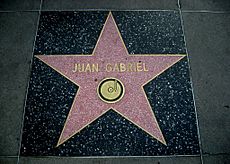
The American Society of Composers, Authors and Publishers (ASCAP) honored Juan Gabriel with the Latin Songwriter of the Year Award in 1995, 1996, and 1998. In 1999, he won the People's Choice Awards for Best Regional Artist. That same year, he received a Lifetime Achievement Award. A statue of Juan Gabriel was put up by Billboard in Mexico City's Plaza Garibaldi in 2001. This statue is still a popular place for mariachi performances. In 2009, he was honored as the Latin Recording Academy Person of the Year. He also received his own star on the Hollywood Walk of Fame in May 2002.
When news of his death was confirmed, it became a worldwide trending topic on Twitter. The President of Mexico, Enrique Peña Nieto, called him one of Mexico's "greatest musical icons". United States President Barack Obama also spoke about Juan Gabriel's death. He said Juan Gabriel's music "crossed borders and generations" and that "his spirit will live on in his enduring songs". Gabriel Abaroa, the CEO of the Latin Recording Academy, said Juan Gabriel's legacy was "much more than one or hundreds of songs; he composed philosophy." He added that Juan Gabriel "broke taboos, performed amazingly, and won over many different audiences." Leila Cobo of Billboard called Juan Gabriel a "prodigal performer". She noted that his songs were "romantic, everyday, emotional compositions that managed to connect with many people and situations."
Juan Gabriel's songs have been sung by many artists, including Rocío Dúrcal, Gloria Trevi, La India, and Marc Anthony. Marc Anthony even said that Juan Gabriel's song "Hasta Que Te Conocí" inspired him to start his career in Latin music. Many artists have recorded tribute albums to Juan Gabriel. A TV series based on Juan Gabriel's life, called Hasta que te conocí, began airing on April 18, 2016. The series ended on August 28, which was the same day Juan Gabriel passed away. Colombian actor Julián Román played Juan Gabriel, and Juan Gabriel himself was an executive producer for the show.
Selected Films and Television Shows
- 1965: Noches Rancheras
- 1975: Nobleza ranchera
- 1976: En esta primavera
- 1978: Del otro lado del puente
- 1979: El Noa Noa
- 1980: Es mi vida
- 2013: ¿Qué Le Dijiste A Dios?
- 2016: Hasta que te conocí
Discography
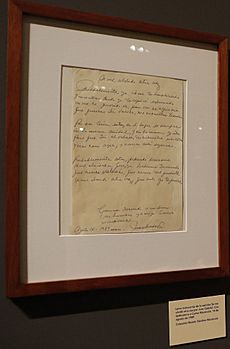
- 1971: El Alma Joven...
- 1972: El Alma Joven Vol.II
- 1973: El Alma Joven Vol.III
- 1974: Juan Gabriel con el Mariachi Vargas de Tecalitlán
- 1975: 10 Éxitos de Juan Gabriel
- 1976: A Mi Guitarra
- 1976: Juan Gabriel con Mariachi Vol. II
- 1977: Te Llegará Mi Olvido
- 1978: Siempre en Mi Mente
- 1978: Espectacular
- 1978: Mis Ojos Tristes
- 1979: Me Gusta Bailar Contigo
- 1980: Recuerdos
- 1980: Juan Gabriel Con Mariachi
- 1980: Ella
- 1981: Con Tu Amor
- 1982: Cosas de Enamorados
- 1983: Todo
- 1984: Recuerdos, Vol. II
- 1986: Pensamientos
- 1988: Debo Hacerlo
- 1990: Juan Gabriel en el Palacio de Bellas Artes
- 1994: Gracias por Esperar
- 1995: El México Que Se Nos Fue
- 1996: Las Tres Señoras (Beltran/Mendoza/Villa) – Temas y Produccion de Juan Gabriel
- 1997: Juntos Otra Vez with Rocío Dúrcal
- 1998: Con la Banda...El Recodo with Banda El Recodo
- 1999: Todo Está Bien
- 2000: Abrázame Muy Fuerte
- 2003: Inocente de Ti
- 2010: Juan Gabriel
- 2015: Los Dúo
- 2015: Los Dúo, Vol. 2
- 2016: Vestido de Etiqueta por Eduardo Magallanes
- 2022: Los Dúo, Vol. 3
- 2023: México con Escalas en Mi Corazón (Ciudades)
Concert Tours
- Volver Tour (2014)
- Bienvenidos al Noa Noa Gira (2015)
- Mexico Es Todo Tour (2016, died during tour)
See also
 In Spanish: Juan Gabriel para niños
In Spanish: Juan Gabriel para niños
- List of best-selling Latin music artists
- Music of Mexico
Images for kids
 | Georgia Louise Harris Brown |
 | Julian Abele |
 | Norma Merrick Sklarek |
 | William Sidney Pittman |


